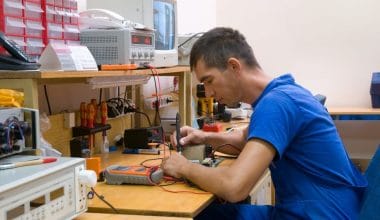Have you ever been curious about how your air conditioner maintains a temperature? Well, that’s where Freon comes into play – it’s like the ingredient in AC systems. Imagine Freon, as a superhero dedicated to ensuring your comfort and working behind the scenes to keep your room nice and cool.
So, how does Freon AC work its magic? In this simple guide, we’re going to unravel what Freon is, where it came from, and why it’s a big deal. No complicated jargon – just a friendly guide about the stuff that makes your AC tick.
Table of contents
What Is Freon AC 101?
Freon is a special gas used in air conditioners to make them cool. It goes through a process where it turns into cool air that your AC blows around. There are different types of Freon, and some are more expensive depending on how easy they are to get.
When people say their AC needs a recharge, they mean it needs more Freon. But here’s the thing, some types of Freon can harm the environment. So, now there are rules and efforts worldwide to use friendlier alternatives in air conditioners to help the planet.
READ ALSO: 50 Short Inspirational Memes That Put a Smile on Your Face
Types of Freon AC 101
Here are the five main types of Freon AC 101:
- R-22 (Chlorodifluoromethane): Commonly known as Freon, R-22 was widely used in air conditioning systems. However, its production has been phased out in many countries due to its ozone-depleting properties, and alternatives are recommended.
- R-410A (Puron): This is a more environmentally friendly alternative to R-22. It doesn’t contain chlorine and is commonly used in newer air conditioning systems. It has a higher cooling efficiency but requires different equipment due to its higher operating pressures.
- R-134a (1,1,1,2-Tetrafluoroethane): Used in automotive air conditioning systems and as a refrigerant in some household appliances, R-134a is a hydrofluorocarbon (HFC) with lower environmental impact compared to older Freon types.
- R-404A: A blend of HFC refrigerants, R-404A is commonly used in commercial refrigeration systems, such as supermarket freezers and ice machines.
- R-290 (Propane) and R-600a (Isobutane): These are hydrocarbon refrigerants used in some household refrigerators as more environmentally friendly alternatives, as they have low global warming potential.
How Does Freon AC Work in a Home?

A simple breakdown of how it works:
- Compression: The process starts in the compressor unit outside your home. The compressor pressurizes the Freon gas, turning it into a high-pressure, high-temperature gas.
- Condensation: The hot, pressurized gas flows through coils on the outside part of the air conditioner. As it loses heat to the outside air, it transforms into a high-pressure liquid.
- Expansion Valve: The high-pressure liquid then moves inside the evaporator coils. Here, an expansion valve allows the liquid to expand, causing it to evaporate and turn into a low-pressure, low-temperature gas.
- Evaporation: This low-pressure gas now absorbs heat from the indoor air as it flows through the evaporator coils. This heat absorption cools the air, and the Freon becomes a low-pressure gas again.
- Return to the Compressor: The cycle repeats as the low-pressure gas returns to the compressor unit to start the process anew.
This continuous cycle of compression, condensation, expansion, and evaporation is how Freon facilitates the transfer of heat, keeping your home cool and comfortable.
READ ALSO: Golden-chain Tree: All You Need to Know
Problems With Freon AC?
Here are a few problems you are likely to encounter with your Freon AC:
- Refrigerant Leaks: Freon leaks can occur due to aging components, physical damage, or corrosion, leading to decreased cooling efficiency.
- Environmental Impact: Freon, especially types containing CFCs or HCFCs, has environmental concerns due to ozone depletion and high global warming potential. Transitioning to eco-friendly refrigerants is encouraged.
- Compatibility Issues: Using the wrong refrigerant or mixing different types can damage the AC system, affecting its performance and efficiency.
- Phase-Out of R-22: R-22, a common Freon type, is being phased out due to environmental reasons. Systems using R-22 may face challenges in finding replacement refrigerants.
- Inadequate Cooling: Reduced cooling capacity can result from factors like dirty air filters, faulty compressors, or issues with the evaporator or condenser coils.
- Faulty Components: Problems with components like the compressor, capacitor, or expansion valve can lead to AC malfunctions and require professional repair.
- Poor Maintenance: Neglecting regular maintenance, such as cleaning coils or changing air filters, can decrease system efficiency and contribute to problems over time.
- Thermostat Issues: Incorrect thermostat settings or malfunctions can lead to temperature control problems and inefficient operation.
- Electrical Problems: Faulty wiring, capacitors, or electrical connections can disrupt the AC’s performance and lead to system failures.
READ ALSO: How Does a Water Heaters Work?
Frequently Asked Questions on How Does Freon AC Work
With proper maintenance, Freon can last the lifespan of the AC system, but it may need recharging if there are leaks.
Freon is a synthetic refrigerant created through chemical processes, combining chlorine, fluorine, and carbon to form chlorofluorocarbons (CFCs) or hydrochlorofluorocarbons (HCFCs).
No, Freon is not naturally occurring. It is a human-made compound developed for use as a refrigerant in cooling systems.
Consider upgrading to a system that uses an alternative refrigerant, as R-22 is being phased out.
Conclusion
Freon serves as the backbone of our air conditioning comfort, seamlessly regulating temperature through its various forms. Delving into the question of “how does Freon AC work” enhances our appreciation for the science behind these cooling systems.
It invites us to envision a future where comfort and environmental responsibility harmoniously coexist. By comprehending the intricate mechanisms of Freon AC, we gain insight into the delicate balance between efficient cooling and minimizing environmental impact.
References
- www.luceaircon.sg – Air Conditioning 101: What Is Freon and Why Is It in Your AC?
- Thefurnaceoutlet.com – Freon AC 101: Everything You Need to Know
- Home.howstuffworks.com – What Is Freon and How Does It Work?
- www.fourseasonsheatingcooling.com – What Is Freon and Why Is It Important?





